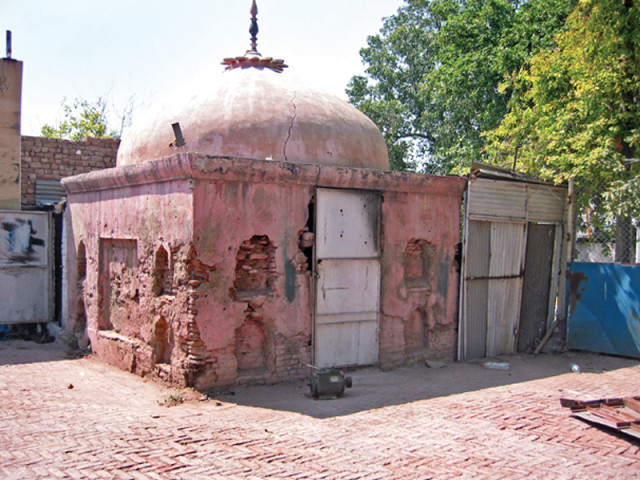From ponds to park: ‘Panj Tirath belongs to the nation, not one dept’
Urge government to preserve city’s heritage sites, act against illegal occupation.

Two minarets (one pictured above) are all that is leftover of the historical Panj Tirath. Most of the structure was razed down in the 1970. PHOTO: FILE
What was once a temple and one of the most sacred places for Hindus in Peshawar is now a public park.
Panj Tirath, which got its name from the five pools of water present there, comprised a temple and a spacious lawn with peeple and date trees. Years of neglect, however, was not what brought upon its ultimate demise – it was razed down in the 1970s to make way for the building of what was then known as the Sarhad Chamber of Commerce and Industry.
The two minarets and a building which remain of this otherwise lost heritage site now come under the ambit of Chacha Yunus Park and Khyber-Pakhtunkhwa (K-P) Chamber of Commerce and Industry (KPCCI).
This loss is felt most by the Hindus settled in this region. Many would bring their dead for cremation and it also served as the venue of an annual two-day festival. They now blame the government for failing to protect the site.
“When the building is not a property of any individual, how can they occupy it? It belongs to the whole nation,” said All Pakistan Hindu Rights Movement Chairman Haroon Sarab Dayal.
“We should be kept in the loop about what is happening to our religious places. Hindus have spent centuries in this part of the subcontinent and it is full of archaeological sites important to us,” he said.
Dayal claimed dozens of other places have also been illegally occupied by citizens.
Historian Humayun Akhund agreed the ground on which KPCCI stands today is a historical site. He maintained it was occupied by tribesmen of an influential political party, who claimed they purchased parts of it from the owners.
“Important heritage sites of the province should be preserved as they contain valuable remains from the Hindu rule in the area,” urged Akhund.
Though a notable historical site, Panj Tirath falls neither under the authority of the Auqaf Department or the K-P Archaeology Department – it is left at the mercy of the city’s inhabitants.
Published in The Express Tribune, September 10th, 2013.













COMMENTS
Comments are moderated and generally will be posted if they are on-topic and not abusive.
For more information, please see our Comments FAQ